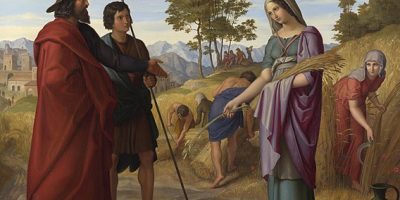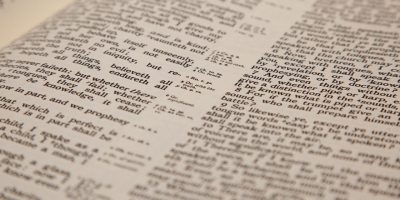The Book
of Ruth
summaries and outlines

Book Summary
The book is a story of Naomi’s transformation from despair to happiness through the selfless, God-blessed acts of Ruth and Boaz. Naomi moves from emptiness to fullness, from destitution to security and hope.
[Source: https://www.gotquestions.org/Book-of-Jeremiah.html]
Picture Source: By Julius Schnorr von Carolsfeld -Public Domain, https://commons.wikimedia.org
/w/index.php?curid=536505

Title
The book is named after one of its main characters, a young woman of Moab, the great-grandmother of David and an ancestor of Jesus. The only other biblical book bearing the name of a woman is Esther..
[Source:NIV Study Bible, Copyright © 1985, 1995, 2002, 2008, 2011 by Zondervan.]

Author and Date of Writing
The author is unknown. Jewish tradition points to Samuel, but it is unlikely that he is the author because the mention of David (4:17,22) implies a later date. Further, the literary style of Hebrew used in Ruth suggests that it was written during the period of the monarchy.
Ruth lived during the time of the judges; the book was written sometime after David became king in about 1010 BC.
[Source:NIV Study Bible, Copyright © 1985, 1995, 2002, 2008, 2011 by Zondervan.]
Ruth Outline
I. Book I (Ps 1–41)
- Introduction: Naomi Emptied (Ruth 1:1–5)
- Naomi Returns From Moab (1:6–22)
- Ruth Clings to Naomi (Ruth 1:6–18)
- Ruth and Naomi Return to Bethlehem (Ruth 1:19–22)
- III. Ruth and Boaz Meet in the Harvest Fields (ch. 2)
- Ruth Begins Work (Ruth 2:1–7)
- Boaz Shows Kindness to Ruth (Ruth 2:8–16)
- Ruth Returns to Naomi (Ruth 2:17–23)
- Naomi Sends Ruth to Boaz’s Threshing Floor (ch. 3)
- Naomi Instructs Ruth (Ruth 3:1–5)
- Boaz Pledges to Secure Redemption (Ruth 3:6–15)
- Ruth Returns to Naomi (Ruth 3:16–18)
- Boaz Arranges to Fulfill His Pledge (Ruth 4:1–12)
- A. Boaz Confronts the Unnamed Guardian-Redeemer (Ruth 4:1–8)
- B. Boaz Buys Naomi’s Property and Announces His Marriage to Ruth (Ruth 4:9–12)
- Conclusion: Naomi Filled (Ruth 4:13–17)
- Epilogue: Genealogy of David (Ruth 4:18–22)